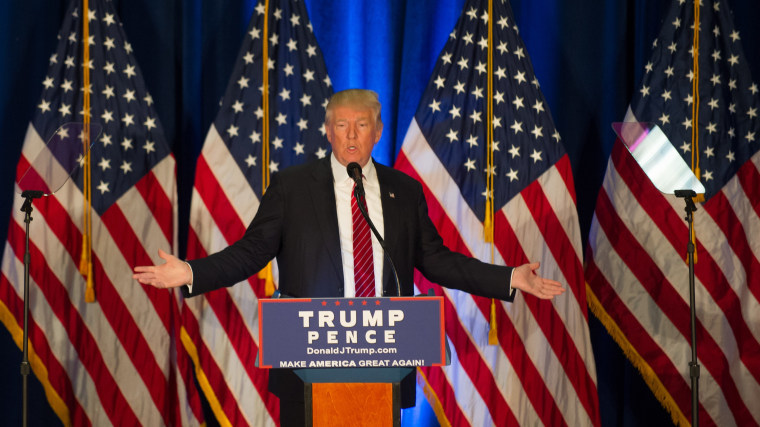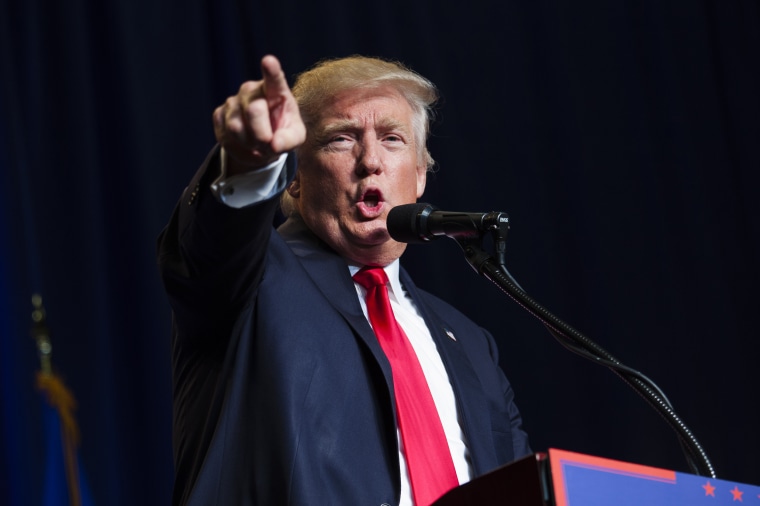Donald Trump’s call for volunteer election monitors is raising fears about voter intimidation at the polls this fall.
“We’re going to watch Pennsylvania,” Trump told a crowd in Altoona, Penn. Friday night. “Go down to certain areas and watch and study and make sure other people don't come in and vote five times.”
“We have to call up law enforcement and we have to have the sheriffs and the police chiefs and everybody watching,” Trump added.
Trump’s campaign followed up by asking visitors to its website to sign up to be a “Trump Election Observer.” Those who do so receive an email declaring: “We are going to do everything we are legally allowed to do to stop crooked Hillary from rigging this election. Someone from the campaign will be contacting you soon.”
Trump’s claim that people might vote five times—at other campaign stops he’s said it could be ten or even fifteen times—is belied by the facts.
One study by Justin Levitt, a respected expert and Loyola Law School professor, found just 31 incidents of voter impersonation fraud out of over 1 billion votes cast across 14 years. Others have found similar results.
Pennsylvania passed a voter ID law in 2012. It was later struck down, in part because the state was unable to point to a single case of in-person voter fraud to justify it.
Most states allow political parties to use poll-watchers, but bar them from acting in a manner that could be intimidating or could lead to vote suppression. Adding more potential for conflict, some states and counties have recently allowed people to carry firearms to the polls.
A 1982 consent decree, issued by a federal court after Democrats claimed Republicans were intimidating minority voters, bars the Republican National Committee from conducting some voter fraud prevention efforts that could have a suppressive effect on voting. It’s not clear whether the Trump campaign would be bound by the decree.
Marc Elias, a lawyer for the Hilary Clinton campaign, said in a radio interview Monday that the campaign would look “very very carefully” at whether Trump’s program constitutes illegal voter intimidation.
The Trump campaign didn’t respond to a request for comment. But campaign spokesman Jason Miller said in a statement to NPR: "To be clear, liberals love to throw out the voter intimidation card. What we're advocating are open, fair and honest elections.”

That’s not calming the fears of voting rights advocates.
“There is no room in the election process for untrained ‘election watchers’ who may bring their own biases to the process, and scrutinize -- and thereby intimidate -- voters who don't look like them,” said Kristen Clarke, the executive director of the Lawyers Committee for Civil Rights Under Law. Clarke’s group conducts its own election monitoring, but with the goal of ensuring that eligible voters are able to cast a ballot.
Some Trump supporters also are noting that Barack Obama had his own “Voter Protection Program” in 2008. But that effort, too, was aimed at protecting the rights of legitimate voters . It explicitly told volunteers not to challenge voters’ eligibility.
Trump’s new program, by contrast, appears more like the election monitoring conducted by True the Vote, a Tea-Party-linked group that aimed to root out voter fraud and have drawn charges of voter intimidation. In 2010, Harris County, Texas, officials said they’d received several complaints of True the Vote volunteers being disruptive, NBC reported. And two years later, some Ohio voters complained of receiving official letters telling them their right to vote was being challenged, after they were targeted by the group. One True the Vote leader told volunteers in 2012 that the group’s goal was to give voters a feeling “like driving and seeing the police following you.”
Adding to concerns is that Trump’s call for volunteer observers comes not long after the U.S. Justice Department announced it will reduce the number of federal election observers it deploys to the polls this fall, who are charged with preventing voter suppression and intimidation. The Justice Department has said the Supreme Court’s 2013 ruling weakening the Voting Rights Act, Shelby County v. Holder, required the move, though some voting rights advocates disagree.
Donald McGahn, a top election lawyer for the Trump campaign, has met with a Republican lawyers group that's planning its own poll-monitoring program, The Washington Post reported.
“What they want to do is create a pretty select, Navy SEAL-type operation that takes the data we’re able to provide and deploy resources of the highest caliber,” Randy Evans, the chairman of the lawyers group, told the paper. “If you have 7,000 lawyers on the ground, and 200 sophisticated election attorneys on call, you can move quickly.”
The Justice Department's decision to reduce in the number of election observers "helps a lot," Evans added. "“It takes away the suggestion that the Democrat machine is being supplemented by government officials.”
